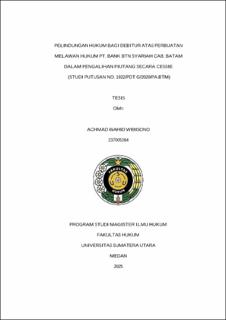| dc.description.abstract | The unilateral assignment of receivables (cessie) by an Islamic bank without the debtor's notice or consent creates legal issues, as it contradicts the principles of justice and transparency in Islamic law and may generate legal uncertainty for the debtor as a consumer. One of the cases examined is Decision No. 1922/Pdt.G/2020/PA.Btm of the Batam Religious Court, in which a debtor filed a lawsuit against the Islamic bank and the assignee of the receivables, claiming the transfer was carried out without their knowledge or approval.
The objective of this research is to analyze the legal implications of unilateral assignment of receivables by a bank to a debtor as a consumer within the context of a financing system transitioned from sharia to conventional. It also aims to examine the legal protection available to debtors against unlawful acts by PT. Bank BTN Syariah Batam Branch in the assignment of receivables through cessie, and to assess the legal considerations of the panel of judges in Decision No. 1922/Pdt.G/2020/PA.Btm.
This research Usess a normative legal method with a descriptive-analytical approach, using statutory, case-based, and comparative methods. The data sources consist of primary legal materials such as laws and court decisions, secondary legal materials such as literature and legal journals, and tertiary legal materials such as legal encyclopedias and dictionaries. Data are collected through literature review, and analyzed qualitatively through legal systematization and normative interpretation.
The research findings indicate that the unilateral assignment of receivables without informing the debtor is invalid, resulting in the rullification of the receivables transfer conducted by PT. Bank BTN Syariah Batam Branch. Legal protection for the debtor includes preventive protection, which obliges the bank to comply with the principles of transparency and deliberation as regulated by DSN-MUI Fatvas and OJK regulations, and repressive protection through legal remedies such as filing a lawsuit for unlawful acts in court. In Decision No. 1922/Pdt.G/2020/PA. Btm, the panel of judges determined that the creditor's actions constituted an unlawful act and partially granted the debtor's claim as a form of rights restoration and enforcement of justice and legal certainty for sharia financial service consumers. | en_US |


